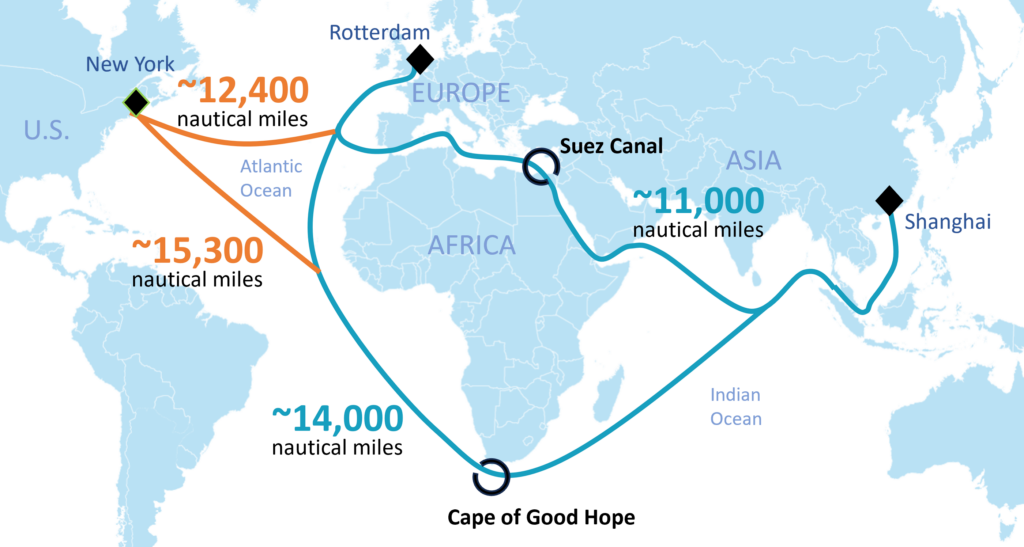Major carriers have announced the suspension of all Red Sea operations following targeted attacks on commercial vessels, including an attack on the MSC Platinum III on December 15 in the Bab Al Mandeb Straight. Thankfully, no injuries were reported, but the vessel suffered some fire damage in the drone attack and has been taken out of service.
The number of carriers refusing to risk Red Sea transits via the Suez Canal is growing by the day. As of this morning, carriers who have opted to pause Red Sea transits and/or reroute around the Cape of Good Hope – along Africa’s southern tip – include MCS, Maersk, Hapag Lloyd, CMA CGM, ONE, OOCL, Zim, HMM, Evergreen, and Yang Ming; tanker owners Frontline and Euronav; car carrier Wallenius Wilhelmsen; and oil and gas companies BP and Equinor. Additional carriers are likely to follow suit in the coming days.
Rerouting vessels around the Cape of Good Hope will lead to significant transit delays, adding roughly 10 – 14 days to sailing time. Freight rates will also face upward pressure due to increased operating costs and fuel consumption.

What Shippers Should Expect from a Prolonged Diversion
As the transit route through the Cape of Good Hope adds 40% to the voyage distance, there will be a significant reduction in capacity due to fewer vessel turns. As a result, vessel capacity will become tighter as carriers are forced to reduce the number of previously scheduled sailings – with some cargo possibly not able to find space – which in turn will drive up rates. While we do not expect a repeat of the catastrophe experienced in the early days of the pandemic due to the current oversupply of capacity, the longer the detour persists, the more likely rates will be under pressure. Additionally, shippers should be prepared for the potential of equipment shortages, as cargoes will travel further to reach their destination.
Carriers will continue to monitor the situation and will likely make adjustments to vessels and routings as the situation evolves, most likely at the last minute.
Shippers should also anticipate the imposition of additional surcharges – including bunker fuel (BAFs) and war risk – and general rate increases, which will further add to the landed cost of cargos.
Some experts are warning that further escalation of the violence in the Red Sea could potentially lead to a complete closure of the Suez Canal, and any disruption within these waterways will have a domino effect that could have dire consequences. While a complete closure is unlikely, it cannot be ruled out.
About the Suez Canal
The Suez Canal connects the Mediterranean Sea to the Red Sea and provides the shortest maritime route between Asia and Europe. It is one of the most heavily used shipping lanes, with more than 17,000 vessels passing through it annually, and accounts for ~30% of global vessel traffic. The Bab Al Mandeb, which stretches 32km from the southern end of the Red Sea to the western end of the Gulf of Aden, serves as the sole route for vessels transiting the Suez Canal.

